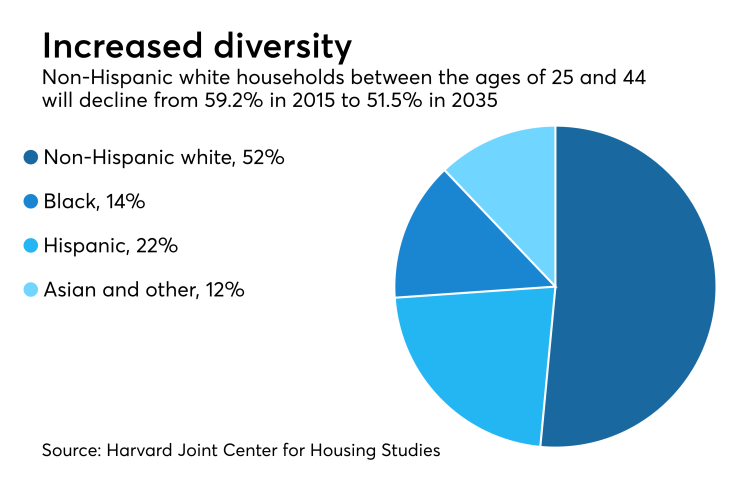The young adult homeownership rate should increase by 1.5 percentage points over the next two decades as education levels among racial and ethnic minorities continues to rise.
"Because education levels of racial and ethnic minorities have been rising steadily, and because income and wealth tend to increase with higher education levels, we would expect the probability of homeownership to go up for these groups," wrote researchers from the University of Southern California in a report sponsored by Fannie Mae. Education level is one indicator for the likelihood of a young adult to purchase a home, a
The findings contradict a popular narrative that the increase in racial and ethnic diversity should result in a lower homeownership rate among young adults.

The number of minority households among those between 25 and 44 years old should increase from 40.8% as of 2015 to 48.5% by 2035, according to figures from the
There is one scenario that found the homeownership rate among young adults would decline over the next 20 years by between 0.5 and 1 percentage point. But that was only using "the unlikely assumption" that education, income and wealth remain constant within racial and ethnic groups as diversity increases. "We argue that this is the wrong scenario to consider," the researchers said.
The homeownership rate could rise by as much as 2.5 percentage points if interracial gaps in education closed, and by between 6 and 7 percentage points if gaps in income and wealth were to close as well.
"The simulations also clearly show that rising educational attainment among racial and ethnic minorities outweighs the assumed negative effect of growing racial and ethnic diversity on the overall young-adult homeownership rate," the report said.
The simulations did not take into account any changes in market conditions. Underwriting was different in the pre-boom period between 1999 and 2001 compared with the post-bust years from 2009 to 2013. If either of those conditions were to return, that would have a more substantial impact on young adult homeownership rates than any changes in demographics, education, income and wealth, the paper said.
The homeownership rate among those 50 and older is 65% and as these people age further, they are likely to become sellers.
"The looming sell-off of millions of baby boomer homes provides ample motivation for investigating alternative policies to bolster the homeownership demand of today's young adults," the researchers said.





